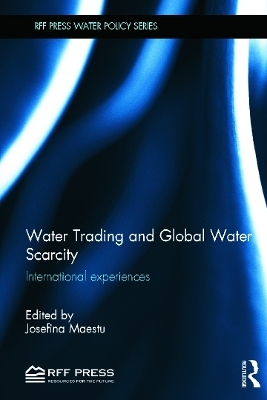
Water Trading and Global Water Scarcity
Routledge (Verlag)
978-0-415-63821-0 (ISBN)
Water scarcity is an increasing problem in many parts of the world, yet conventional supply-side economics and management are insufficient to deal with it. In this book the role of water trading as an instrument of integrated water resources management is explored in depth. It is also shown to be an instrument for conflict resolution, where it may be necessary to reallocate water in the context of increasing scarcity.
Recent experiences of implementation in different river basins have shown their potential as instruments for improving allocation. These experiences, however, also show that there are implementation challenges and some limitations to trading that need to be considered. This book explores the various types of water trading formulas through the experience of using them in different parts of the world. The final result is varied because, in most cases, trading is conditioned by the legal and institutional framework in which the transactions are carried out. The role of government and the definition of water rights and licenses are critical for the success of water trading.
The book studies the institutional framework and how transactions have been undertaken, drawing some lessons on how trading can improve. It also analyses whether trading has really been a positive instrument to manage scarcity and improve water ecosystems and pollution emission problems in those parts of the world which are most affected. The book concludes by making policy proposals to improve the implementation of water trading.
Josefina Maestu is Coordinator of the United Nations Office to Support the International Decade for Action "Water for Life" 2005-2015, based in Zaragoza, Spain. For 12 years she has been a lecturer on economics of natural resources management at the University of Alcala, Spain. Pedro Arrojo, Carl J. Bauer, Henning Bjorlund, Javier Calatrava, Francisco Cubillo, Joseph W. Dellapenna, Guillermo Donoso, Antonio Embid, Teodoro Estrela, Franklin M. Fisher, Alberto Garrido, Carlos M. Gomez, Almudena Gomez-Ramos, Stefan Görlitz, Ronald C. Griffin, Shreekant Gupta, Ellen Hanak, Kristiana Hansen, Richard Howitt, Eduard Interwies, David Katz, Cody L. Knutson, Jay R. Lund, Jennifer Mc Kay, Nirmal Mohanty, Dannele E. Peck, Robert J. Rose, Peter Rossini, Ricardo Segura, Antonio Serrano, Miguel Solanes, Sarah Wheeler, Jeffrey Williams, Jesus Yague, and Mike Young.
Introduction: Myths, Principles, and Issues in Water Trading Part 1: Water Trading experiences 1. Introduction: How We Are Implementing Water Trading: Learning from Experience 2. Managing Water Stress, Drought and Climate Change in The 21st Century: Water Trading as part of Integrated Approaches in Water Management 3. New Frontiers for Water Management. The California Experience 4. Water Trades in The Western US: Risk, Speculation And Property Rights 5. Water Markets and Their Environmental, Social And Economic Impact In Australia 6. Trading Into and Out of Trouble. Australian’s Water Allocation and Trading Experience 7. The Evolution of Water Markets in Chile 8. The Experience of Water Markets and the Market Model in Chile 9. Breaking the Gridlock in Water Reforms through Water Markets: Experience and Issues for India 10. Areas of Conflict and the role of Water Trading: the case of Spain 11. Voluntary Water Trading in Spain: a Mixed Approach of Public and Private Initiatives Part 2: Concerns about Water Trading and how are we dealing with them 12.Introduction: Concerns about Water Trading 13. The Myth of Markets For Water 14. Cash Flows: Markets for Environmental Flow Allocations 15. Experiences with Water Quality Trading in the United States of America Part 3: Reforms to overcome legal and institutional barriers to trading 16.Introduction: Considering Institutional frameworks and institutional reforms in trading 17. Water and Development in Latina America: Rights, Markets, Economic Context and Institutional Requirements 18. The Theory and Practice of Australian Institutional Reforms to Incorporate Water Markets in Integrated Water Resources Management 19. Legal reforms that facilitate trading of water use rights in Spain 20. Drought Management, Uncertainty and Option Contracts Part 4: Can we get incentives right? 21. Introduction: Incentives and prices in water trading 22. Models for Optimal Water Management and Conflict Resolution 23. Optimization Modelling in Water Resource Systems and Markets Conclusions and Recommendations for Implementing Water Trading: How Water Trading can be Part of the Solution
| Erscheint lt. Verlag | 19.11.2012 |
|---|---|
| Reihe/Serie | RFF Press Water Policy Series |
| Zusatzinfo | 15 Tables, black and white; 30 Line drawings, black and white; 45 Illustrations, black and white |
| Verlagsort | London |
| Sprache | englisch |
| Maße | 156 x 234 mm |
| Gewicht | 860 g |
| Themenwelt | Naturwissenschaften ► Biologie ► Ökologie / Naturschutz |
| Wirtschaft ► Volkswirtschaftslehre | |
| ISBN-10 | 0-415-63821-6 / 0415638216 |
| ISBN-13 | 978-0-415-63821-0 / 9780415638210 |
| Zustand | Neuware |
| Haben Sie eine Frage zum Produkt? |
aus dem Bereich


